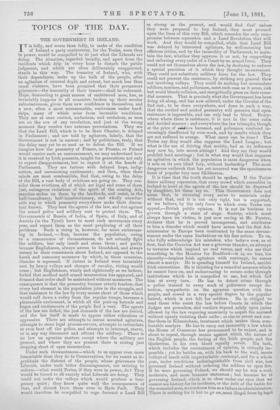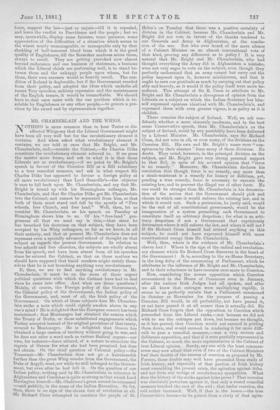TOPICS OF THE DAY.
THE GOVERNMENT IN IRELAND.
IT is folly, and worse than folly, to make of the condition of Ireland a party controversy, for the Tories, were they in power, would be compelled to do just what the Liberals are doing. The situation, regarded broadly, and apart from the incidents which drip in every hour to disturb the public judgment, and which are often deliberately exaggerated, stands in this way. The tenantry of Ireland, who, with their dependants, make up the bulk of the people, after an agitation of unusual depth and extent, but much less than usual violence, have been promised that their permanent grievance—the insecurity of their tenure—shall be redressed. Hope, descending to great masses of embittered men, has, as invariably happens in all countries, broken up their secular submissiveness, given them new confidence in themselves, and a new, often a most unreasonable, restiveness under hard- ships, many of which arise from incurable conditions. They are at once excited, audacious, and credulous, as men are on the eve of any revolution, and just at the wrong moment they receive two extreme provocations. They see that the Land Bill, which is to be their Charter, is delayed in Parliament ; and are told by agitators, falsely, that the Government is not in earnest ; and by politicians, truly, that the delay may yet be so used as to defeat the Bill. If we imagine how the peasantry of France, or Prussia, or Poland would receive such an announcement, we may understand how it is received by Irish peasants, taught for generations not only to expect disappointment, but to expect it at the hands of Parliament. They are furious with delayed hope, indig- nation, and unreasoning excitement ; and then, when their minds are most combustible, find that, owing to the delay of the Bill, a vast body of evictions are going on. They con- sider those evictions, all of which are legal and some of them just, outrageous violations of the spirit of the coming Act, marches stolen on them by the landlords, and resist, in the half-tumultuary, half-insurrectionary, and wholly unendur- able way in which peasantry everywhere make their discon- tent known. They beat the agents of the law, and riot against the armed police and soldiery sent to protect them. The Governments of Russia, of India, of Spain, of Italy, and of Austria (in the Tyrol) have to meet such movements every year, and regard them as the most perplexing of all their problems. Such a rising is, however, far more embarrass- ing in Ireland, — first, because the population, owing to a concurrence of circumstances, do not actually fight the soldiers, but only insult and stone them ; and partly because Englishmen, always averse to bloodshed, and always uneasy in their consciences about Ireland, are opposed to the harsh And summary measures by which, in those countries, disorder is repressed. If rioters in Ireland were invariably met by heavy volleys and charges of cavalry, rioting would cease ; but Englishmen, wisely and righteously as we believe, forbid that method until armed insurrection has appeared, and demand that order shall be maintained without massacres. The consequence is that the peasantry become utterly fearless, that every bad element in the population joins in the struggle, and that resistance to the law by every means short of those which would call down a volley from the regular troops, becomes a pleasurable excitement, in which all the pent-up hatreds and hopes and excitements of the people find a vent. The agents of the law are defied, the just demands of the law are denied, and the law itself is made to appear either ridiculous or oppressive. There are attempts to rescue arrested agitators, attempts to stone legal process-servers, attempts to intimidate or even beat off the police, and attempts to intercept, starve, or in any way disconcert and affront the soldiery. There is no law on agrarian matters except where the military are preSent, and where they are present there is rioting just
stopping short of open insurrection.
Under such circumstances—which to us appear even more lamentable than they do to Conservatives, for we resent as in- gratitude the distrust of the people, whose grievances the Liberals, under such bitter discouragement, are striving to redress—what would Tories, if they were in power, do f They would be forced to (16 exactly what Liberals are doing. They could not order the volleys which would produce a tem- porary quiet ; they know quite well the consequences of that, and shrank from them oven in Hyde Park. They would therefore be compelled to urge forward a Land Bill as strong as the present, and would find that' unless they were prepared to buy Ireland, they must proceed upon the lines of this very Bill, which concedes the only com- promise between repression and a Land Revolution that will work, And they would be compelled, while that Land Bill was delayed by interested agitators, by well-meaning but officious critics, and by the imbecility of Parliament, to main- tain the law, whether they approve it or not, by supporting and enforcing every order of a Court by an armed force. They could not set themselves above the law, by declining to enforce a special provision of it which they thought inconvenient. They could not substitute military force for the law. They could not prevent the resistance, by striking any general blow• not involving volleys. They could do nothing but accumulate' soldiers, marines, and policemen, meet each case as it arose, risk but avoid bloody collision, and energetically press on their reme dial measure. That is precisely what the Government has been doing all along, and has now ordered, under the Circular of the 2nd inst., to be done everywhere, and done in such a way,. that the excited and misled peasantry will perceive that open resistance is impossible, and can only lead to blood. Every- where where there is resistance, it is met in the same calm, and decided manner ; and everywhere the law triumphs, thought at the price of aslaiers harassed, and policemen rendered in- creasingly disaffected by over-work, and by insults which they are not suffered to avenge. What more can be done ? The Tories say they would also suppress the Land League ; but what is the use of driving that society, bad as its influence• may now be, into secret sittings ? And they say they would prohibit land meetings ; but in what way would that suppress an agitation in which the population is most dangerous when it acts on its own blind fury, without leadership ? The most dangerous outbreak that has yet occurred was the spontaneous burst of popular fury near Skibbereen.
It is time that the truth should be spoken. If the Tories desire military repression, that every crowd which assembles in Ireland to howl at the agents of the law should be dispersed' by slaughter, let them say so. This Government does not. mean that, is straining every nerve to maintain order without that, and it is not only right, but is supported,, as we believe, by the only force to which even Tories can appeal,—British public opinion. It is not its business to. govern through a state of siege. Society, which must always have its victim, is just now raving at Mr. Forster,. declares that he is proved incompetent, and attributes to him a disorder which would have arisen had the first Ad- ministrator in Europe been confronted by the same circum- stances under the same limitations on his free action. To us, who fully acknowledge his mistakes, who believe now, as at first, that the Coercion Act was a grievous blunder, an attempt to terrorise which inspired no real terror, and who see that something in the Member for Bradford—it is, we fear, his• sincerity—inspires Irish agitators with contempt, he seems almost a martyr. He is spending himself for Ireland, amidst Irish execrations. He is thirsting for a remedial measure which he cannot force on, and endeavouring to secure order through institutions which he is compelled to use, but which fait him at every turn. He has to detect crime through a police trained to every work of policemen except de- tection, sympathetic on the agrarian question with the people, and cowed in a very special degree by the popular
hatred, which is not felt for soldiers. He is obliged to send those who resist the law before Courts in which the• Judges are powerless, and verdicts depend solely upon juries allowed by the law requiring unanimity to acquit the accuse& without openly violating their oaths ; or else to arrest and con- fine them in Xilmainlaarn, treatment which makes them com- fortable martyrs. He has to carry out inexorably a law which the House of Commons has pronounced to be unjust, and is about to repeal, through means against which the nature of the English people, the feeling of the Irish people, and the Quakerism in his own blood equally revolt. Ilia task, which includes the contentment of opinion, is virtually im- possible ; yet he battles on, with his back to the wall, meets volleys of insult with imperturbable contempt, and for a whole year, under conditions indistinguishable from civil war, has governed Ireland without ordering the soldiers to open fire. If he were governing Poland, we should say he was a cool, moderate, and most humane statesman ; but because he is• governing Ireland, which is so close under our eyes that we cannot see history for its incidents, or the drift of the battle for the wounded men, we condemn him as a failure in administration. There is nothing for it but to go on, meet illegal force by legal
force, support the law—just or unjust—till it is repealed, and leave the verdict to Providence and the people ; but we may, meanwhile, display some fairness, some patience, some appreciation of the difficulties of a situation which seems to the wisest nearly unmanageable, or manageable only by that shedding of half-innocent blood from which it is the good quality of Englishmen, till the Berserker madness seizes them, always to recoil. They are getting provoked now almost beyond endurance, and one business of statesmen, a business which the Liberal chiefs are performing well, is to stand be- tween them and the unhappy people upon whom, but for them, their own excesses would so heavily recoil. The con- dition of Ireland is deplorable, but if the Government receded from their policy, and adopted the ideas which underlie all recent Tory speeches, military repression and the maintenance of the English tenure, it would be irremediable. We should have to deal once more with the one problem which is in- soluble by Englishmen or any other people,—to govern a pro- vince by the sword and by representation together.





























 Previous page
Previous page